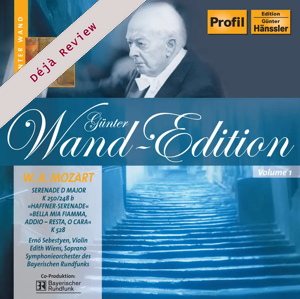
Déjà Review: this review was first published in October 2005 and the recording is still available.
Wolfgang Amadeus Mozart (1756-1791)
Serenade for Orchestra in D Major, K 250 “Haffner” (1776)
Bella mia fiamma, addio-Resta, o cara (1787)
Edith Wiens (soprano)
Bavarian Radio Symphony Orchestra/Günter Wand
rec. live, 21 May 1982 (Serenade), 23 May 1982 (aria), Nürnberg Mozart Festival, Germany
Profil PH04053 [66]
Serenades, divertimenti and cassations, all music designed for light occasions and often performed out of doors, form a large and vital part of Mozart’s output.
In 1776 alone he composed nine such works. The so-called Haffner – commissioned by the son of the mayor of Salzburg to be played at the wedding celebrations of his sister – is his crowning achievement in the genre. At almost an hour long, it represents a number of forms. Individual movements can be pieced together for what looks like a symphony; others would easily make up a violin concerto. Dance forms are also not neglected.
Günter Wand was a conductor of the old Kappellmeister mold, a quiet, gentle and devout man of music who regarded Mozart as the be-all of composers. He likened Mozart’s genius to a religious experience, telling his biographer that music as perfect as Mozart’s was undeniable proof of the existence of God. Such devotion plays itself out in these elegant performances.
The serenade is a large-scale work, and given that it was intended more as occasional music than as a work for uninterrupted concentrated listening, there can be a problem or two with connectivity between the movements. Wand chooses tempi that are wholly conducive to a complete hearing. Phrases are turned so elegantly that one’s attention has no chance to wander. This is for a large performing force, larger perhaps than any of Mozart’s similar works, a circumstance that gives evidence to the outdoor nature of the piece. Wand makes full use of the colors and sonorities available to him from a modern full-scale symphony orchestra. Yet, the overriding affects here are grace and elegance. At no time does the listener ever feel overpowered. At no time does one have to stop and wonder what this would sound like in a period specialist’s hands with antique instruments. Wand finds a splendid balance between power and gentility, charm and energy. Ernö Sebestyen’s superb violin solos are icing on the cake.
The concert aria Bella mia fiamma was written as a consolation prize for a favorite singer who was not cast in the original production of Don Giovanni. The story goes that said soprano locked Mozart in a drawing room and refused to let him out until the piece was finished for her. He in turn insisted that she would not get the score unless she could read it perfectly at sight. Whether or not this is true it is a good tale and good music like this should have a good tale to go with it. Edith Wiens is a singer that I knew heretofore in name only. I am glad to have made her vocal acquaintance finally. She sings with full throated vigor and careful attention to the text. And, she is quite capable of a fine dramatic expression or two as well.
Profil have been releasing a fine series of discs from radio archives, and in particular have given Wand and Klaus Tennstedt some very well deserved re-examination. This disc is a nice addition to any collection. The series has on the whole been well packaged, with excellent notes, and of first rate sound quality. In this particular issue though, the absence of texts and translations for the concert aria is inexcusable.
With only that one little caveat, this is a highly recommendable disc.
Kevin Sutton
Buying this recording via a link below generates revenue for MWI, which helps the site remain free.




















